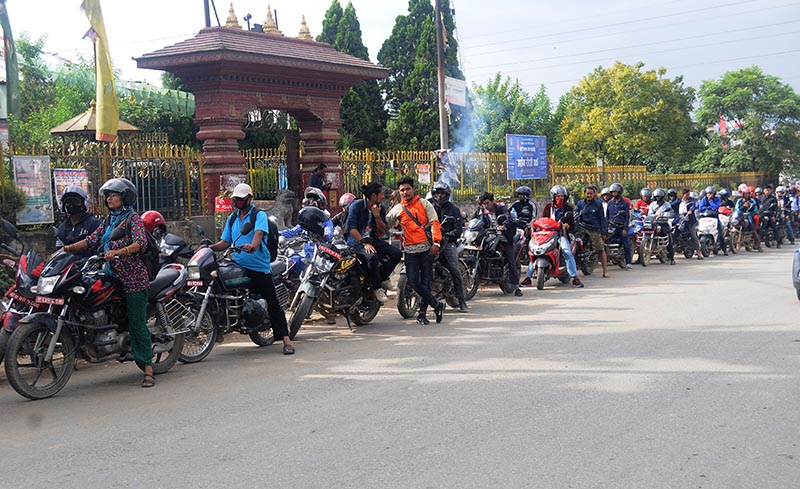Transporters’ protest affects fuel supply
Kathmandu, September 20
A number of fuel pumps remained shut and serpentine queues could be seen at refilling stations that were in operation today.
Fuel stations have been facing shortage of petroleum products since fuel tanker operators started halting fuel supply, expressing solidarity with the protest initiated by transporters against a few transport-related provisions in the recently enacted Criminal Code.
A group of transport entrepreneurs, especially those operating tankers, have been staging protest since Tuesday against provisions in the penal code, including 10-year imprisonment for accidents and life imprisonment for causing death.
Fuel-ferrying transport entrepreneurs, however, were reluctant to comment on this issue. Ishwor Lama, president of Nepal Petroleum Transporters’ Federation, defended the action, stating, “Transport entrepreneur organisations are protesting the penal code provisions, not just those engaged in supplying fuel.”
Meanwhile, Basanta Sharma, coordinator of the struggle committee of transporters, claimed that all investigations carried out by the government and police favoured victims. “The penal code should ensure that probe into any accident is unbiased,” said Sharma.
Should the protest by transport entrepreneurs prolong, the fuel supply situation will deteriorate further, as Nepal Oil Corporation has limited stock of fuel — 45,000 kilolitres of petrol and diesel, which is sufficient to address the demand for less than a week.
Meanwhile, NOC has warned the fuel tanker operators that it will scrap the agreement with them if they do not resume fuel transport immediately. NOC officials said fuel-ferrying tankers could not halt supply of petroleum products at any cost, as they were appointed by NOC to ensure smooth supply of petroleum products in the domestic market.
Stating that the agitating tanker operators have not even clearly communicated their demands to the corporation, Birendra Goit, spokesperson for NOC, said, “Halting supply of essential goods like petroleum products is illegal and will not be tolerated at any cost.”
As NOC does not have its own fuel-supplying transport mechanism and has to depend on private sector, tanker operators often halt supply of petroleum products seeking fulfilment of their demands.
An NOC official, seeking anonymity, said the corporation was mulling over leasing a few fuel tankers to ease the situation if the transporters continued to disrupt supply.
READ ALSO:






